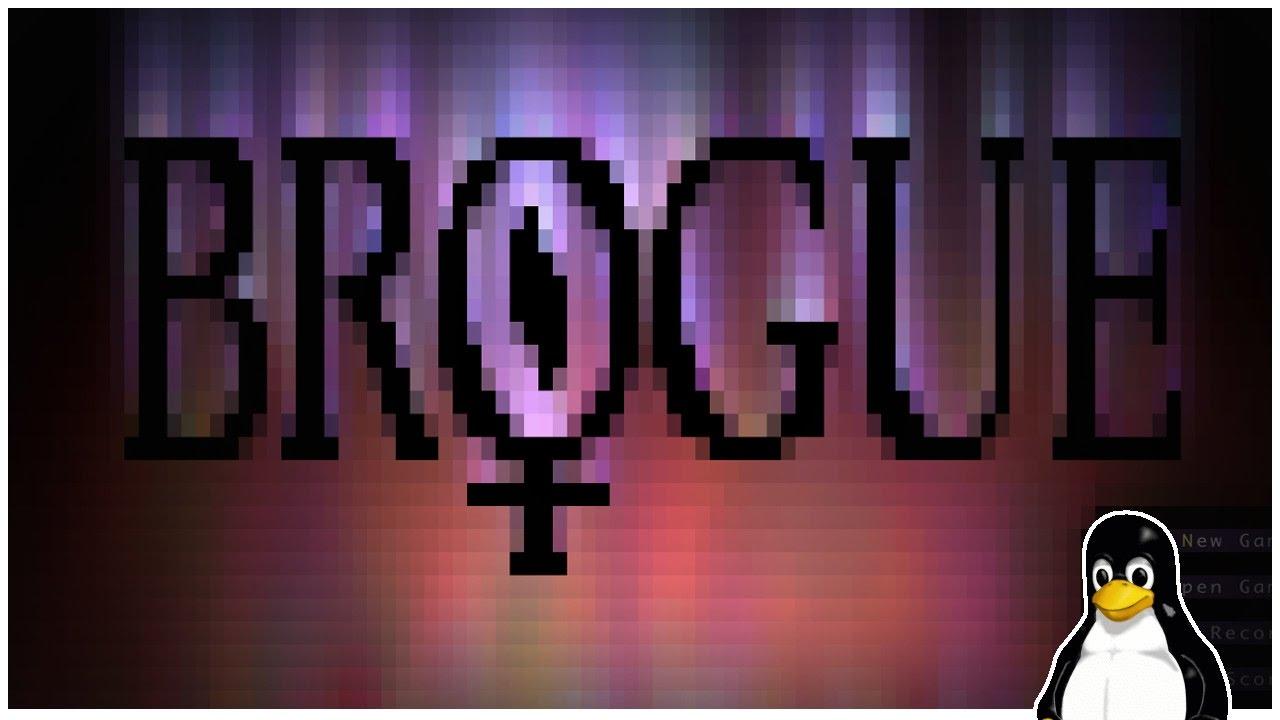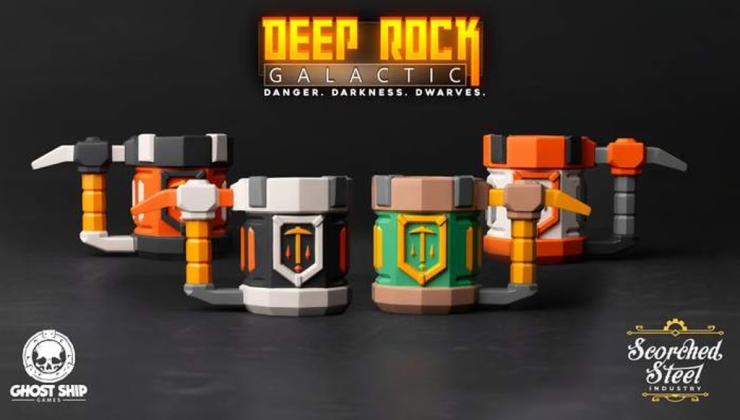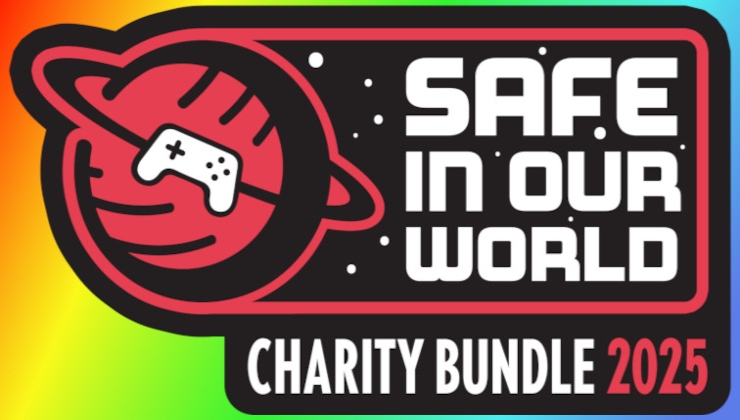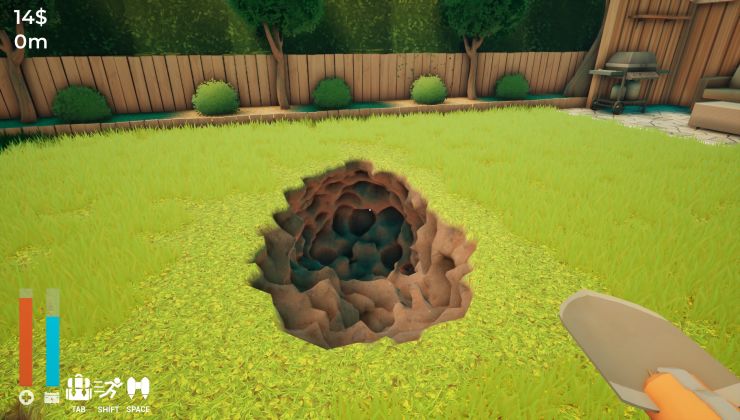Roguelikes. The term is everywhere these days, and every bit as played-out as “zombies” or “the Dark Souls of…”. We see it so much on game descriptions that we’re sick of it.
The common characteristics of roguelikes are well established. Procedurally generated dungeons, permadeath, turn-based combat, poorly labelled potions and a greedy adventurer who doesn’t know the meaning of the word “preparation”. All of this, plus more minor similarities across the genre, have been traditional since the original Rogue, released in 1980, and the later Hack and Nethack from 1982 and 1987 respectively. There are loads of roguelikes out there, from classics like ADOM and Angband, to more graphical experiences like Tales of Maj’Eyal and Dungeons of Dredmor, and those who take the concept in totally different directions. Caves of Qud and Slay the Spire come immediately to mind.
This brings us to Brogue. My obsession. So let’s see what the fuss is about.

Direct Link
Brogue is a free and open source game created in 2009 by Brian Walker [Official Site], and is available for a variety of platforms including Linux, Raspberry Pi and iPhone/iPad. Unexpectedly, it doesn’t seem to be an Android build. As you might expect, it requires very little power to run and tends to be very stable.
As roguelikes go, Brogue sticks pretty close to the original. The game has all the hallmarks listed above, although it is missing a levelling system. This is where the game diverges most notably from the original. Instead, the game substitutes three items in their place: potions of strength and life which improve your character directly, and scrolls of enchantment, which improve your items in some really powerful ways. Those scrolls are your key to success and add a tremendous amount of depth.
That’s really the heart of the Brogue experience. Gameplay is heavily situational and item-focused, so choosing which to improve and what combination will get you out of a sticky situation is vital. Will you focus enchantments on your weapon (which improves both damage and strength requirement), or will you focus on your armour? Perhaps you’re playing a mage with a collection of magical staves or a thief with a ring of stealth. Pouring everything into a single item can make it obscenely powerful, but leave you lacking in other areas. Or maybe you like to spread the love between two or three items and settle for each being strong but not legendary. Either way, it’s a trade-off you’ll have to deal with as you go.

Graphically, Brogue is a gorgeous game. While the default experience uses all the same ASCII characters we’ve come to know and love, the addition of colour, dynamic lighting, and map generation that makes the most of both results in some amazing vistas to take in. Underground lakes infested with deadly eels (and they will mess you up!), stinking swamps shrouded in explosive gases, yawning chasms and impassable lava fields all lie before you. Further down, the increasing gloom is lit by fields of burning brimstone, suggesting more terrible wonders to come.
Earlier, I mentioned that I am, sadly, a Brogue addict. It’s true. This game got its hooks into me and refused to let go. It’s not just the call of adventure or the lure of the beautiful environments that keep me coming back again and again (and again and again and...). Rather, I think the addictive qualities are built into the game itself. One of the most important is the ease of replay. You will die in this game. So many times that Dark Souls characters will look at you with sympathy. But it’s okay. Thanks to how lightweight the game is, the time between “You die...” and “New Game” is only a matter of seconds, lowering the barrier to starting over to almost nothing. It becomes a cycle, as you look at the mistakes you made, resolve never to do something so foolish again, and then hop back in to make entirely new mistakes.

But it’s a pleasant addiction, and even better it makes for some vivid war stories. Where the original Rogue was admittedly pretty bare-bones, there is such a variety of unique monsters and situations that they come alive in the retelling. Like the time I caught sight of a dangerous Dar Blademaster, and hit it with a staff of discord before it could see me. By the time I ran into it again, the monster had cleared out the whole area and was so injured it only took one good poke with my rapier to meet the reaper.
Or when I was trying out scrolls and I hit one of aggravate monsters, which made the entire level’s worth of baddies zero in on me. Fortunately, I’d already used a scroll of sanctuary so they couldn’t reach me but it left me trapped. It was a stroke of luck I had a scroll of discord in my pack, so I set that off and let the whole crowd fight it out, leaving me to step out and take care of the winner.
Or when I took advantage of a wand of plenty and a wand of empowerment to create a loyal swarm of flying, vampiric ogres. Or when I died to a group of wraiths after being weakened by an invisible creature who set upon me in the shadows. Or the time I had to deal with two Dar Blademasters and a lightning turret, while my instant-death whip decided it didn’t really feel like activating today. Stories like that become common the more you play, and that adds to the fun.
I’m an addict, yeah. But at least I’m one of the happy sorts.
Brogue can be downloaded directly from the website for free, or you can play it online (site) and watch others try to make it to the fabled Amulet of Yendor and back alive.
... I specially admire when he describes the joy of games I don't like, because it helps me to learn and empathize with him.Same. I've never been into this type of game, but his excitement for them makes me wish I was. His attitude makes him pretty endearing.
Last edited by Shmerl on 26 Mar 2018 at 12:48 am UTC
I have spent a few hours there... never got the Amulet of Yondor. (or even close)
That being said, I might go and try Brogue... that or just rediscover Nethack again...
Still , compared to the fact that most people today in gaming seem to be addicted to lootboxes and microtransactions someone being addicted to a game for its actual gameplay and quality is refreshing :)
Nice intro to Brogue there Kels ;-)
Last edited by razing32 on 26 Mar 2018 at 7:02 am UTC
Psst...I'm the author of this article and not HexDSL. But in lieu of a trailer for the game, I thought his video was the best quick overview around.Sorry. At the time I got so absorbed by the video I took little notice of the text. But your article is an excellent explanation of the feelings expressed by HexDSL.
We've got pretty much the same point of view, I think. Although I looked up the video after the article was mostly written, so it's less explaining and more the both of us coming to the same conclusions independently.
Long Live [NetHack](http://www.nethack.org/)!!! After 30+ years, it is up to version 3.6.
I have spent a few hours there... never got the Amulet of Yondor. (or even close)
That being said, I might go and try Brogue... that or just rediscover Nethack again...
There are a bunch of places you can play the original Rogue online. I haven't looked for Nethack, but it wouldn't surprise me a bit if the same was true.
Speaking of old games. This reminded me of Mordor: The Depths of Dejenol. Quite basic dungeon crawler with minimal graphics, but what a fun game back in the day. It runs nice in Wine (you need to run some midi synth for music).
The interface for that looks really cool, and kinda dominates the visuals. It'd be interesting to see what a modern dev would do with that sort of concept.
The interface for that looks really cool, and kinda dominates the visuals. It'd be interesting to see what a modern dev would do with that sort of concept.
Yep, it's light on graphics but quite heavy on the interface and it has tons of items, monsters, spells, abilities and guilds.
Last edited by Shmerl on 26 Mar 2018 at 9:39 pm UTC
Long Live [NetHack](http://www.nethack.org/)!!! After 30+ years, it is up to version 3.6.
I have spent a few hours there... never got the Amulet of Yondor. (or even close)
That being said, I might go and try Brogue... that or just rediscover Nethack again...
There are a bunch of places you can play the original Rogue online. I haven't looked for Nethack, but it wouldn't surprise me a bit if the same was true.
There is a public NetHack server at https://alt.org/nethack/ The webpage gives information on how to use the public server as well as many statistics(average dungeon depth;list of acensions). It appears relatively active. To play NetHack on this server, just telnet to alt.org (on normal port 23 or port 14321) or ssh to [email protected].
Also, remember that NetHack can be installed locally as well and binaries are included in most distro repos.
While there are tilesets for nethack, the base game uses ascii text.
The true beauty of Nethack is in its depth. There is a full [NetHack wiki](https://nethackwiki.com/wiki/Main_Page) with almost 3,000 articles describing the game.
Looking at the stat page, the number one quickest ascension is only 1.5 hours... however, the number 100 is closer to 4 hours... and this list is all time (from 2008 when the public server started logging the stats) Of course, to get to the point where you can actually finish a game by acension will take 100s of hours and playthroughs... let alone to the point you have the skill to actually try a speedrun.
For me the de facto standard for a roguelike is Dungeon Crawl: Stone Soup. Does anyone know how Brogue compares to DCSS?
The controls are a heck of a lot easier to remember, and the level maps are smaller. As mentioned in the article there's no levelling or skill progression, so it's more complex in DCSS while there's more focus on using items in Brogue. A lot of the mechanics are the same though, with the usual permadeath, walking into something to attack, and so forth.
For me the de facto standard for a roguelike is Dungeon Crawl: Stone Soup. Does anyone know how Brogue compares to DCSS?
The controls are a heck of a lot easier to remember, and the level maps are smaller. As mentioned in the article there's no levelling or skill progression, so it's more complex in DCSS while there's more focus on using items in Brogue. A lot of the mechanics are the same though, with the usual permadeath, walking into something to attack, and so forth.
Thanks.
Do you know how many levels there are and about the replay value? What I love about DCSS is how many different characters and classes there are. There is a ton of replay value. Of course they have had a lot of time to develop and fine-tune this game. To be honest, I only got away with the orb one single time so far, as a Gargoyle Fighter of Okawaru, after playing hundreds and hundreds of games for the past... ten years? After I finally escaped for the first time last year I felt great. I still have to morgue file etc.
I'm always interested in new roguelikes but this is what I measure them against. :) Since Brogue is free I should probably just give it a try, though.
Last edited by starfarer on 27 Mar 2018 at 6:43 pm UTC
For me the de facto standard for a roguelike is Dungeon Crawl: Stone Soup. Does anyone know how Brogue compares to DCSS?
The controls are a heck of a lot easier to remember, and the level maps are smaller. As mentioned in the article there's no levelling or skill progression, so it's more complex in DCSS while there's more focus on using items in Brogue. A lot of the mechanics are the same though, with the usual permadeath, walking into something to attack, and so forth.
Thanks.
Do you know how many levels there are and about the replay value? What I love about DCSS is how many different characters and classes there are. There is a ton of replay value. Of course they have had a lot of time to develop and fine-tune this game. To be honest, I only got away with the orb one single time so far, as a Gargoyle Fighter of Okawaru, after playing hundreds and hundreds of games for the past... ten years? After I finally escaped for the first time last year I felt great. I still have to morgue file etc.
I'm always interested in new roguelikes but this is what I measure them against. :) Since Brogue is free I should probably just give it a try, though.
Brogue has 26 levels, and to me at least a tonne of replay value. The wide variety of approaches afforded by scrolls of enchantment and the synergy of the different items makes the experience pretty varied. The furthest I've gotten is in that high scores screenshot, level 19, and I felt pretty accomplished for getting that far. I can't imagine how getting away with the Amulet would feel, it's like a distant goal.
Or maybe we need a better way to search trough articles?
I was thinking about this game today... It was really hard to find. How about editing the title so that we can easily find it later? Including ASCII, Retro and Roguelike in the title would make the search function behave better, I think ;)
Or maybe we need a better way to search trough articles?
I'm not sure how editing the title would change that much, but it does have the Roguelike tag on it. If you use the "Search by category" function on the sidebar and choose that, you should be able to find what you're looking for easily.
Another Brogue junkie here! Nice to meet you. Have you ever ascended? If so, how did you do it? Would love to talk brogue with you and show you some cool seeds.
Hi there,
Another Brogue junkie here! Nice to meet you. Have you ever ascended? If so, how did you do it? Would love to talk brogue with you and show you some cool seeds.
I've never successfully ascended, no. I think the furthest I've gotten was about the 23rd floor or so, on a wand of plenty/wand of empowerment build that I used to make a flock of flying vampire ogres.









 How to set, change and reset your SteamOS / Steam Deck desktop sudo password
How to set, change and reset your SteamOS / Steam Deck desktop sudo password How to set up Decky Loader on Steam Deck / SteamOS for easy plugins
How to set up Decky Loader on Steam Deck / SteamOS for easy plugins
See more from me